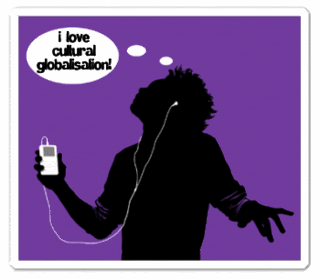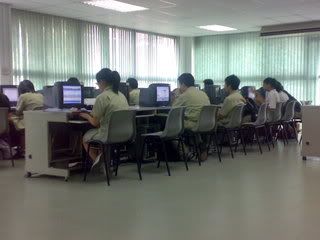Technological Posts
Globalization – Study of Global Warming
The Article I read:
Doyle, Alister, “Scientists start polar study amid global warming” chinaelections.org, Web URL: http://www.alertnet.org/thenews/newsdesk/L28696290.htm, Date retrieved: 13th May, 2007
The alarm has gone off. Countries around the world started to carry out research to study about global warming, with an intention to sustain the Earth as sanctuary of mankind.
In the article, I learn about on March 1, 2007, scientists start their study on poles. They examine the animals and people’s their, collecting air samples for the study of the effect of air pollution upon global warming. By launching over two hundred projects, they try to learn more about global warming, so that they are able to find out solutions of two problems: how to abate global warming and what can be done against the effect of global warming.
From my point of view, the technology is advancing rapidly and benefits the mankind. However, ironically, a great amount of greenhouse gas is emitted. Thus, global warming is inevitable, and a state does not have the ability to control it in its borders. Sovereignty of the state is challenged and national boundary loses its meaning. However, humans have to find a method to slow down the process and prepare the effect of it. Countries all over the world has carried out projects to work on it, trying to use the most sophisticated technology to fight against global warming, the side effect of their own technology. Almost every country in the world signed Kyoto Protocol, and make up their mind to do something for global warming. However, fearing the state sovereignty would be challenged, the USA and Australia refused to ratify the protocol. The USA is still one of the countries that emit the most amount of greenhouse gas. Nevertheless, American scientists are still sent to do research upon global warming.
On the other hand, implements against the effect of global warming, including stronger hurricane, increasing temperature and rising sea level has been planning. Due to the result of melting ice caps in the poles, which may even fasten the pace of global warming as less heat are reflected to the space with the help of ice, the sea level rises. It is warned by scientists that coastal cities and countries will be affected. In Singapore, to fight against the rise of sea level, scholars have been sent to Dutch to study the technology of building dykes. Although Singapore could only be affected by rising sea level 50 or 100 years later, it is good to prepare beforehand.
I believe with every countries working together as one, solutions will be find out to use upon global warming, so that we can pass a healthy world to our offspring.
Cyber Crime

The Article I read:
Shri. G.S. Awana, Asstt, “Introduction to Cyber Crime” chinaelections.org, Web URL: http://cybercrime.planetindia.net/intro.htm, Date retrieved: 1st May, 2007
Reflection: (by Lin Fangxiong, 2A/06)
The article I read is about various kind of cyber crime. There are people who get others credit card numbers illegally, design pornographic websites, sell weapons online, use email to spread invalid information and fake currencies or certificates using computers.
As the technology is developing rapidly, more and more computer experts appear. However, some of them do not use their knowledge to help to develop new programmes that can benefit mankind. Instead, since knowledge is a double-edged sword, they decide to use the evil side of their knowledge to do something destructive – crime. As a result of the development of sophisticated technology, these experts use their knowledge to hack in other computers to gain interest.
Moreover, as the technology is more and more advanced, computer programmes become more sophisticated. This allows people who are not computer experts to spread messages through different ways. They can send emails to their friends, post their ideas in the forum, publish their stories in the blog, or even create their own websites. Some people make use of this opportunity and share information with others. Some, however, use this advantage to do immoral or illegal things. For example, they may defame their rivals through spreading invalid information.
Thus, we can see that cyber crime has been globalized. People from different countries do illegal or immoral things using computer. Some crimes that committed are international. For example, a hacker from one country may steal an amount of money through Internet and removed into his own account in another country.
Since the Internet, or more generally, cyberspace is not limited by country boundaries, it is very difficult for a government of a country to control. To solve this problem, I think the experts who believe in justice have to contribute their might to fight against cyber crime. Someone may say people have rights to express their idea freely in the Internet, but if some ideas are illegal, immoral or agitating, they have to be blocked and out of access by computer users. Thus, I believe that actions have to be taken against cyber crime.
"Hamster Energy & alternatives"
The Picture is Chosen from:
Cartoonstock, “Alternative Energy Gifts”, cartoonstock.com,
Web URL: http://www.cartoonstock.com/directory/a/alternative_energy_gifts.asp,
Date retrieved: 1st May, 2007
Other Reference:
Google, “Diesel-Electric Hybrid Train”, alternative-energy-news. info,
Web URL: http://www.alternative-energy-news.info/diesel-electric-hybrid-train,
Date retrieved: 1st May, 2007
Reflection: (by Lin Fangxiong, 2A/06)

In the picture, although it is unrealistic and impossible to use “hamster energy” (asking a man to turn the wheel), it suggests an important point: Mankind is facing the shortage of non-renewable resources, e.g. fossil fuels, and they have to start seeking alternative energy.
Scientists nowadays have perceived that some of the non-renewable resources are going to be used up within decades, and some of them, such as fossil fuels and uranium have great negative effect on our environment and health. The burn of the fossil fuels emits green house gas such as carbon dioxide, which enhances global warming and the radiation of uranium is lethal.
To save the non-renewable resources for offspring and improve world’s environmental standard, countries all over the world start researches and projects regarding alternative energy. They tried to make use of solar energy, wind energy, hydro energy that is renewable energy and environmental friendly. Some of the countries also design cars or trains that can help to save resources and benefit the environment. For example, Japanese has been studying on diesel-electric hybrid train which consists of a battery-assisted diesel-electric traction engine and can cut emission levels by up to 50%. Furthermore, with the application of electromagnetism, China has successfully worked out “aerotrain”, which saves the energy and is environmental friendly.
I believe that there is a need for countries to develop such technology to benefit ourselves, our offspring and the environment, and as time being, more measures that can save the resources and benefit the environment will occur and our world will become a better place for people to live on.
Globalization of Medicine
The Consortium for Globalization of Chinese Medicine, “Promotes Research and Technology Development – the Third Meeting of Consortium for Globalization of Chinese Medicine” tcmedicine.org,
Web URL: http://www.tcmedicine.org/en/client_news_detail.asp?RecordId=34, Date retrieved: 15th April, 2007
Reflection: (Done by Lin Fangxiong (2A/06)
This article mainly talks about the conference (Third Meeting) that organized by the Consortium for Globalization of Chinese Medicine took place in the University of Hong Kong. Government officials from many other countries attended the meeting. The issues discussed including Quality Control, Clinical, Database, Herbal Resource, External Affairs & Industrial Liaison and Intellectual Property.
In my opinion, the conference benefit the global people’s health remarkably as the technology of Chinese Medicine can finally benefit the world instead of only benefit the Chinese people. In the past, making of Chinese Medicine was a very secret technology and rarely known by people from foreign countries. Several decades ago, people from other countries started to get to know about the Chinese Medicine. However, not all of them were able to accept Chinese Medicine, because they doubted the effectiveness of the mixture of herbs. People had more faith in pills like aspirin than traditional Chinese herbs.
As time passed, foreign people knew more about Chinese Medicine and started to accept it. Foreigners began to take Chinese Medicine. I believe that the Third Meeting organized by the Consortium for Globalization of Chinese Medicine is able to introduce the technology of Chinese Medicine to more countries and benefits them, at the same time, with around thirty countries’ help, develop the technology of Chinese Medicine. This is because as the people all around the world know about the Meeting, they will realize the important role that Chinese Medicine is playing in the world Medicine technology. More countries will consider joining Consortium for Globalization of Chinese Medicine to know more about it. Thus, more and more countries will understand the effectiveness of Chinese Medicine and accept it. The Meeting will also help to develop the technology of Chinese Medicine because officials from different countries can share their perspectives in the Meeting and people can learn from them. Furthermore, with scientist from different countries’ help, a huge database can be built up, which will not be achieved with a single country’ might. The building of database can facilitate the further exploration of Chinese Medicine. Multi-experiments can also be carried out by different countries to speed up the pace of the development of Chinese Medicine.
In conclusion, the Third Meeting of Consortium for Globalization of Chinese Medicine made a very significant effect and I believe it will enhance the globalization of Chinese Medicine.
15th April
The Article I read:
Ramamurti Shankar, “Globalization and Science: A Speeded-Up Virtuous Cycle” yaleglobal.yale.edu, Web URL: http://yaleglobal.yale.edu/display.article?id=1259, Date retrieved: 8th April, 2007
Reflection: (by Lin Fangxiong, 2A/06)
In this article, the author highlighted the globalization of technology, or to be more specific, science. He defined the globalization of science into two types. One is that science is universal; the other is that the scientific ideas can be spread very fast.
I agree with the author’s definition about the globalization of science. It is true that science is universal. For a certain law or theory, if it was discovered by different scientists in different places, although the processes of the discovery may be different, the law or theory, which is always the truth, is always the same. The author used the discovery of the change of frequency of light as an example, I give another one here: long before the discovery of the Pythagoras Theorem in Europe, which is if a, b are the two sides of a right triangle, c is the hypotenuse, a2 + b2 = c2, the Chinese and the Egyptians had had the same conclusion. Zu Chongzhi, Chinese mathematician who discovered the same theorem, called it 勾股定理 (Gou Gu Theorem), the Egyptians, on the other hands, were able to use strings form a triangle, with three knots and the four knots on two sides, five knots on the hypotenuse, long long ago. Hence this is the universal of science. A law or a theory is discovered in one place of the world, at the other end of the world, the law or the theory that is discovered is still the same.
The other type of globalization of science is the fast spread of scientific ideas. From my perspective, as the Internet becomes an important tool in people’s daily lives, it speeds up the spread of scientific ideas remarkably. It also benefits the scientists in the Third World countries.
In the past, the scientific ideas were printed on the journals and mailed to scientists all over the world. However, if a scientist wanted to give a clever response to the publisher of the journal, he had to post his ideas through letters. As most of the publishers of these journals were in developed countries, it took longer time for the letters of scientists in the Third World to reach the publishers than that in Western countries. Thus, if there were two scientists having an idea at the same time, and one of them from a Western country, one of them from a country in the Third World, the one’s letter from the Western country would more likely to reach the publisher first, the last ideas from the scientist in the Third World might not be used by the publishers.
Furthermore, because of the economic circumstances’ differences between Western countries and the countries in the Third World, the material of the letters from the scientists in the Third World may be less fine than that from the Western countries, and may have less authority compared to the ones from Western countries. Thus, the scientists from Western countries are more likely to take an advantage, and this is very unfair for the scientists from the countries in the Third World.
When Internet is widely used by the people all over the world, the scientists from different part of the world can access all the scientific ideas from the Internet at the same time, the scientists from the Third World will no longer need to wait a long time for the science journal to reach their country. Hence, scientists whose new ideas are aspired can reply the ideas from the Internet immediately and other scientists can see them at once. Thus, all the scientists in the world have a role to play in contributing their ideas for the development of science and technology. They are able to access the information in a faster speed and reply them very quickly, which also led to the speed up of the development of science and technology.
Therefore, the globalization of technology shows the uniqueness of the truth and speed up the development of technology.
29th March
Cultural Posts
Online gaming!
As I was frantically pressing the keys of my keyboard whilst my eyes glued to the screen absorbed as much information to my head as possible, a sudden thought came to mind. I realized that I haven’t finished my last and final post for my SS blog. Reluctantly, I logged off my maple game and started to type out my last post for SS.

This is a picture of an online game that I played many years back. It is a global online game where people from all over the world play the same game and get to interact with others in the cyber world. From the picture, you can see that there are millions of people who play this game, and that if thousands of people could be playing concurrently, this shows that the globalization of online games such as this has reached such successful heights.

As some of my friends can guess, this is the game that I currently play. MapleSEA is the “south east asian” version of MapleGlobal, where people living in SEA can access the game with faster connections. Many people call this game “maple”, and it is unlikely that any students in Singapore would have not heard of this game before. This is the same over some parts of the world whose people participate actively in this game. There are currently 3 known versions of maple. MapleGlobal, MapleSEA and MapleKorea. I shall give a small case study of Korea.
I refer to this article, “The Land of the Video Geek”.
http://www.nytimes.com/2006/10/08/arts/08schi.html?ex=1317960000&en=d11635806cd12df1&ei=5088
How amusing it is, to go for gaming for a date, in such a country like that! The addictive online gaming has caused such rapid changes in the culture of developed countries all over the world. South Korea may be a little bit of an extreme example of cultural change through globalization, but other countries would set a mini example of such.
In Singapore, from a kampong island 80 years ago, right now, walking into the nearest mall, there would be video game shops selling gaming consoles, with smartly-dressed assistants to help you choose what you want. Cyber cafes sprout all over the place, with school kids hoarding all the available seats to challenge each other online.
My opinion on how the globalization of such online games, is from the increasing burden of stress from school, work and so on. Most games allow the players to feel relaxed and happier, a good opportunity to get away from the harsh reality and live in their own virtual world. However, for individuals who go through little or no stress, they also end of playing online games because of influence from friends. (“everyone play, so I play lor”)
Myself, a perfectly normal individual with absolutely no specific talent in whatsoever direction, find it hard to resist such games, and I understand how thousands of people feel about games too. There cannot really be anything to conclude about the globalization of gaming. All I can say is that its may enhance, use or destroy culture. There are many sides to this gaming globalization.
Done by: Pei Yi,
Cultural Expert
Fashion, style and trends

Fashion is a significant expression of cultural identity. Before the western influence which globalizes the way people all around the world dress, different cultures had their own unique clothes and costumes deep set in traditions.
As an example, the Chinese have their outstanding traditional outfits that date way back in the past. Archaeological findings of 18,000 year-old artifacts such as bone sewing needles and stone beads and shells with holes bored in them attest to the existence of ornamentation and of sewing extremely early in Chinese civilization.
But enough of the past, move on to the present. Even though much effort has been put in to preserve the Chinese fashion culture, globalization still has influence over it. Today, Fashion designers use a mixture of traditional and modern ideas to create new fashions. These new fashions also incorporate age-old motifs such as guardian deities, lions, and masks of Chinese opera characters. Some of the distinctive designs include dragons, phoenixes, clouds, and lightning. Motifs from traditional Chinese painting also end up in woven or printed fashion designs.
Along modernized streets, famous fashion banners would stand out in the street, seemingly to invite only the rich and pompous to enter. A normal brown leather bag would be worth many times more with a fashion label than with none. It is a sad truth that in this day and age, people would gladly trade in their ancient cultural styles for expensively fashionable designs which are flooded (or rather, shipped) all around the world.
There are, of course, advantages to this influence of a “standard” fashion. More jobs in the fashion industry have been created, with artistically talented people offering themselves to meet the overwhelming needs and wants of the world’s population.
Disadvantages are quite obvious. In modern cities, citizens may end up more worried about keeping in the latest trends (which change every season) than about other things more important, like saving the environment or something! People lose their own sense of traditional fashion cultures and the sight of people wearing their own unique set of traditional clothes may become a rare sight. In the future, at this growing rate of influence, people from all over the world would be wearing basically the same design of clothes, following a trend that would never cease to keep changing.
Thus, overall, the “western” fashion does more harm than good, but it really depends on which perspective you look at. As a conclusion, people should not forget their own traditional costumes and bring them to extinction.
Done by: Pei Yi,
Cultural Expert.
The Fast food eating culture
Done by:
Pei Yi, The Cultural Expert
The many categories that globalization can be classified into, overlap each other. In this post, I will comment on the spreading of the fast food culture around the world. This is interlinked with health globalization where people’s healths are affected by the influence of such unhealthy food outlets and their systems.
The first thought that comes to mind when “fast food culture” is mentioned, would probably be McDonald’s. They have spread to most parts of the world and have the world’s largest chain of fast-food restaurants.

Fast food restaurants have a fast service speed system, customers can choose to dine in or take away. Some fast food chains have a “drive-thru” so that commuters can maximize their time. This strategy has been proved to be most successful, and many different brands of outlets have sprung up all over the world using this tactic.
The fast food culture has influenced the way that people around the world eat. Instead of wasting precious time in restaurants for the food to be cooked, the hamburgers can be quickly prepared and served hot. People support this because it saves time and still tastes delicious.
Another reason for the success of fast food restaurants is that there is no problem of losing face for certain customers (who might be embarrassed when someone else ordered a more expensive item in a restaurant); the food at fast food restaurants are mostly all similarly priced.
As a result, there are many reasons that explain the globalization of fast foods, and the above are just to name a few. There are advantages to such forms of globalization. Tourists would not have to worry about violating some obscure local custom. However, the disadvantages need to be considered as well. This globalization is replacing local cultures and customs; local food culture is being “swept away” by all-too-familiar logos of fast-food restaurants, and in some cases, is going extinct. While cultures have been replaced before, the speed at which cultures are dying out is unprecedented. The loss of food culture has dramatic effects on people and their descendents.
The iPod
Done by: Pei Yi,
Cultural Expert
In the previous post, I mentioned birthday celebrations as a form of cultural globalization. As a change, I will switch to product globalization. Everyone has probably heard of the iPod before. The iPod is not only an example of an extremely globalized product, it has major influences in assisting cultural globalization through media, ideas and goods.
Here’s a picture of an iPod advertisement.
obviously i edited it :)

More than any other single product from Apple, the iPod has changed the company and the world. Currently, there are five generations of the iPod, and over 28 million iPods have been sold around the world. Thus, Apple has an estimate 75% market share of digital music players.
Before its introduction, MP3 players were the realm of small companies with limited budgets that were unable to provide content. The introduction of MP3 players have caused directly or indirectly, CDs and tapes to have gone dead. As a result, throughout the globe, people have switched to the use of portable MP3 players. In the case of any reader not knowing what an MP3 song is, they are just special electronic file formats for digitized music, allowing you to store and playback songs on your computer, portable MP3 players or stereos. With the growth of interest in Apple’s iPod, it has revolutionized the way people enjoy music.
After the iPod, the entire industry has evolved and grown to the point where the largest computer companies in the world have major interests in the digital music industry. There are numerous companies across the globe like Apple, Sony, Creative, Nomad, Rio, LeMon and many more. With the introduction of the most recognizable aesthetic feature of the iPod - the scroll wheel, other MP3 producing companies have included a touch sensitive scrolling feature. While it is unsafe to say that these companies have “copied” ideas off each other, it is evident that the iPod has played major influences around the globe.
The title of our blog is iGlobalise, an idea from Apple where it names all its products starting with an “i”. Whilst Apple continues to dominate the MP3 market, we should be careful to preserve whatever culture that is left while it lasts.
a few references were taken from:
http://lowendmac.com/orchard/05/1014.html
Birthdays as Cultural Globalization
Done by: Pei Yi,
Cultural Expert
As my first post on cultural globalization, I would prefer to comment on a common topic, “birthdays” instead of reflecting on an article. My mother has just celebrated her 51st birthday today, and this triggered some thoughts about how we came to celebrate birthdays.
Birthday celebrations were originated in the West, and then the spread of a global culture has resulted in a worldwide trend of celebrating birthdays. Large-scale celebration of birthdays in Europe began with the cult of Mithras, which originated in Persia but was spread by soldiers throughout the Roman Empire. Before this, such celebrations were not common; and, hence, practices from other contexts such as the Saturnalia were adapted for birthdays. Because many Roman soldiers took to Mithraism, it had a wide distribution and influence throughout the empire until it was supplanted by Christianity.
Birthday celebrations were rare during the Middle Ages but sufficed with the start of the Reformation. During this period, they were seen as a good way to transfer customs from the saint's days to other dates not linked to the newly repudiated veneration of saints.
Today, millions of people around the globe celebrate their birthdays as a result of globalization. People have the usual cake, with candles on top. The celebration would also include the traditional birthday song. In most English-speaking countries it is traditional to sing the song “Happy Birthday to You” to the honored person celebrating his/her birthday. The Happy Birthday Song melody is thought to be the most frequently sung melody in the world. Even in countries where the English language is not used, the same tune is used, except in a different language.
Zooming into the culture in schools, there are certain “cultures” that students adopt in schools in view of the birthday celebration. One example is 'birthday beats' or 'birthday bashings' in which the birthday child receives a number of punches on their arm that equals their age (for example, 14 punches on the arm for a 14-year-old). Usually it is followed with a 'one for luck' punch which tends to be harder than the rest. Birthday beats are not often malicious but sometimes can be considered bullying and may ruin a child's special day. Across numerous countries, these “cultures” may differ slightly, but the main idea is basically there.
To wrap this topic up, birthdays as cultural globalization does not affect nor destroy unique cultures all around the world, and it is more of another day that people find the excuse to celebrate. Even when birthday celebrations are part of a global culture, the diversity of countries and races across the world will continue to adopt their unique ways of celebrating their birthdays.
Happy birthday, mum.
15th April
Economic Posts
Advantages of economic globalization

As I have been talking a lot about the shortcomings of economic globalization, I thought that it will only be fair if I talk about the advantages economic globalization bring to us as well. Thus, my 5th and last post will be talking about the advantages of economic globalization to give a balance between my arguments.
There must be reasons to why many countries, including Singapore, who want to participate in economic globalization (no matter through what way, such as free trade or foreign investments) even though there are shortcomings about it. In fact, there are many advantages of economic globalization as well.
First, most of the developing and developed countries that participate in economic globalization will be able to see an increase in their economic growth due to the extra profit they can gain from international trade with other countries and foreign investments. Examples will include China and India, whose GDPs rose after having economic integration. This will result in a country being able to boost his/her economy from the profits gained from free trade and investments and raise their standards of living, getting more people out of poverty.
Therefore, with more wealth, the country is able to gain more economic independence as he/she does not need to be that dependent on that few countries to give him/her financial assistance when he/she needs it. This will also result in greater political stability as when states and countries become more economically independent, their desire to wage war on each other will reduce as they already have the resources they want. Thus, economic globalization has its good points as well.
Besides that, through economic globalization, most countries will also see an increase in their economic productivity due to the efficient resource allocation needed for trade purposes. Besides that, with the quick flow of goods, money and services through global markets and free trade, people around the world are able to share their resources and services now, making them more connected then before.
Thus, though economic globalization does not help to increase the GDPs of some developing countries or non-developed countries and lead to inequality between the rich and the poor as there are people who continue remaining in poverty while the others have already got wealthier, economic globalization still benefits some other countries, so we cannot say that it is totally bad. It still has its good points. Let’s not emphasize too much on its shortcomings and neglect the advantages economic globalization brings to us.
Economic expert
Claris
Economic globalization threatens state sovereignty

This cartoon shows a shoe with the word “SINGAPORE” on it and the shoe is stuck to some chewing gum on the ground with the words “US FREE TRADE CONDITION”. This cartoon is actually reflecting the scenario of how the free trade agreement (which helps to achieve economic globalization) with US forces Singapore to change its ban on chewing gum. Gum with therapeutic value such as medicinal gum and oral dental gum can be sold in Singapore. This shows how the pursuit of economic globalization can lead to countries having less state sovereignty.
Free trade refers to a market model where trade of goods and services within or between countries flows unhindered by government-imposed restrictions. It is stated that free trade must allow all the trading partners to have a net profit or else there will be no agreement between the parties. State sovereignty refers to having absolute control over the planning of one’s own countries especially in the political and economical aspects. One state will not have the right to interfere in the internal affairs of others.
However, state sovereignty is compromised during the pursuit of economical benefits. This can be seen in the case of the easing of the chewing gum ban due to the fact that there was pressure from the US representative Philip Crane, R-I11, who said that US was the home of the gum giant Wrigley Company and wants Singapore to allow gum to be sold before agreeing to sign the free trade agreement in 2004.
I think that US should not have laid such a condition in the free trade agreement for Singapore to fulfill and give pressure to her. Though I can understand that US wanted to do so so that they can benefit from the sale of gum, each state should have their own state sovereignty and US comprises Singapore’s state sovereignty by interfering with the laws that Singapore have set for 12 years. I think it is because they know that Singapore wants to sign the free trade agreement with US badly as US is a very rich and advanced country and it will benefit Singapore a lot in the economical aspect so Singapore will agree to any conditions set by them. True enough, Singapore did agree to the sale of gum in order to sign the free trade agreement. I find it interesting to note that economic globalization does threaten state sovereignty as countries that sign free trade agreements will have to agree with the conditions the other countries set. Besides that, they will have to change their policies or laws according to the economic situation of the global markets, so that they can still gain profits. Most importantly, countries are also willing to comprise it for economic benefits and profits. This shows how great the impact economic globalization has on countries and how it can influence them to make certain decisions.
In conclusion, though economic globalization helps to bring profits to countries and increase economic growth, it comprises state sovereignty and this is not a very good thing as we will lose control over our own country and we cannot make decisions ourselves. In my opinion, it is pathetic to result to such a state. Thus, if you still think economic globalization is that fantastic, think twice, because it has its shortcomings too!
Economic expert
Claris
Rich gets richer and poor gets poorer


The first cartoon shows a skinny man lying on half of the Earth (shows that poor people are increasing, many poor people gets poorer) while the second cartoon shows a scale where the weight of 4 white people is the same as many black people. (The people in developed countries are so rich that they have so much to eat and they weigh the same as so may people from non- developed countries) These 2 cartoons show the consequence of economic globalization which is the inequality between the rich and the poor countries.
In my 3rd post, I will state my own personal opinion and stand on whether economic globalization results in inequalities between rich and poor countries and their people. This is a problem that has been persisting since the emergence of economic globalization so I thought that it would be interesting to talk about it.
As all of us know, economic globalization means that there is increased relationship between national economies through international trade and foreign investments where countries will be dependent on each other for profits and economic growth.
By the definition of globalization, it is logical for people to think that economic globalization is good and it will help to narrow the gap between the economies of the poor and rich countries. However, in my opinion, I think that globalization widens the gap instead. The rich seems to be getting richer while the poor seems to be getting poorer.
True indeed, globalization does lead to inequalities between rich and poor countries. The reason is because globalization involves international trade and investments between countries and if one country wants other countries to trade with it or invest in it, the country will need to fulfill a lot of conditions. The conditions include having a lot of resources, (which include capital and skilled workers) a stable and non-corrupt government, the ability to accumulate wealth, investments in infrastructure such as education, health care, transportation etc, so that the people can live longer and work longer and increase the rate of the country’s productivity. Having high productivity can help to produce the goods the other countries want effectively and efficiently while having stable governments can convince other countries that this is a safe country to invest in. This will result in many countries wanting to trade with or invest in that particular country as they think that that country is able to fulfill their requirements.
This can be easily achieved by those developed countries which are also known as the industrialized and richer countries as they can fulfill the conditions needed for international trade. As a result, they are able to trade with other countries and gain profits, making them richer than before. However, to those poor countries who have lack of resources such as capital and skilled workers, (they have a lot of people but they are all unskilled or not educated) non-stable governments and lack of investments in infrastructure due to lack of capital, they are unable to convince the other countries to believe in them to be able to produce goods fast and efficiently. Thus, they will not have a chance to be involved in international trade and gain more profits.
It is important to note that it is not that they do not want to get involved in international trade to increase their economic growth, (though it is the case for some countries as they think that it will affect state sovereignty) but it is because they cannot even fulfill the requirements to have international trade, not to say to participate in economic globalization in hope to increase their economic growth.
Besides that, due to the fact that the people in poor countries are not well educated and unskilled, they are inexpensive to hire and thus the developed countries take advantage of this point and hire the workers there at a low price, resulting in them earning less money, increasing the huge gap between the income of the rich people and the poor.
Therefore, while the developed countries can get richer, the poor countries can only remain in the same situation or get poorer. This is only one of the main reasons that results in the income gap of the rich and poor countries to widen.
Though there are still other reasons such as some countries unwilling to pursue international trade which hinders their economic growth due to fear of affecting state sovereignty, corrupt and uncaring governments such as North Korea, who chose to use the money they have to develop nuclear weapons instead of spending it on their people’s welfare. All these lead to unstable economies of the countries and thus they are unable to get richer. However, in my opinion, economic globalization is still one of the main reasons to why the rich get richer and the poor get poorer as it does not give the chance for some willing countries to participate.
Economic expert
Claris
22/04/07
Hello! I am back for my second post! Recently, I have read an article that is somehow related to international trade which links to globalization of economy.
Name of article: China’s Food Safety Woes Expand Overseas
Source of article: The Straits Times, April 14 2007, Saturday
This article is concerning China, who is having some problems with its food products and this lead to many of its food products being rejected at the American ports. There turns out that there are also previous cases where their food products were banned from entering some countries such as Europe and Japan due to China’s excessive use of antibiotic or pesticide residues. All these food bans have affected China’s economy in a way or other.
I think this is because China is globally intertwined in global trade (which shows globalization of the economy with goods being able to travel across the world freely) and this means that many of their food products are available throughout the world. Thus, if there are problems with their food products, not only will they need to compensate heavily as they have so many products that they have already distributed overseas, but also face the risk of foreign countries banning China’s food exports. This will result in huge losses for China as their income depends a lot on the profits gained from trade between other countries.
Through this real-life example, we can actually see that globalization has a very huge
impact on the economies of countries. It can have a positive impact on their economies
or a negative impact. One example will be because of trade, (which results in
globalization of the economy), China’s food products are able to be distributed overseas
and the exports of meat, produce and processed foods from China have soared in recent
years. This allows them to earn a lot of money. However, because of the increase in
demand of all these food products due to globalization, some farmers in China had to
resort to using pesticides and chemical fertilizers in excess to boost their yields and
harmful antibiotics to control diseases in livestock and seafood. Some even used cancer-
causing industrial dye Sudan Red to boost the value of their eggs. As a result, this leads
to undesirable consequences when countries want to ban these food products because all
of these excess pesticides, fertilizers, antibiotics or because they are contaminated. China
will suffer huge losses in the end. This is so ironical!
Therefore, through this article, we can see how trade can have such a huge impact on the
economy and how it can lead to undesirable consequences. This is one example that
shows that globalization of the economy does not always bring benefits.
Done by: Claris Wah,
Economic Expert
22/04/07
Hello everybody! Since this is the first post of the economic aspect, I would just like to keep it simple and give you all a brief introduction of what has globalization got to do with the economy. This is because I realized that many people do not really get the link between these two (including me originally)… ok, so here it goes…
Basically, globalization refers to the increasing global connectivity and it describes the way that world trade, culture, technologies, politics and ecology have become rapidly integrated over the years as geographical distance and cultural distance no longer pose any obstacles to them.
Globalization of the economy also refers to the increasing global connectivity and integration but in the economics section where the advances made in communication and transportation, combined with free market ideology, have given goods, services and capital unprecedented mobility to travel across the world.
Some examples of the advances made in communication and transportation include the opening up of trade which enables goods and services to travel across the world freely, the increase in foreign investment where companies start to invest and buy their stocks overseas and the opening of capital markets which allows the flow of money across the world. Many international organisations have also been set up to aid in the globalization of the economy such as the WTO (World Trade Organisation) and the European Union. These organisations help to reduce barriers in trade and overseas investments.
Thus, after this introduction, I hope you all will have a better understanding of what is globalization of the economy. As for my next few posts, I will most likely be reflecting on the impact of globalization on the economy and what consequences it will bring as well as other issues related to the globalization of the economy. Perhaps issues concerning the development world markets, global businesses, free trade agreements and economic development of different countries… So, please look out for my posts!
Done by: Claris Wah,
Economic Expert

























